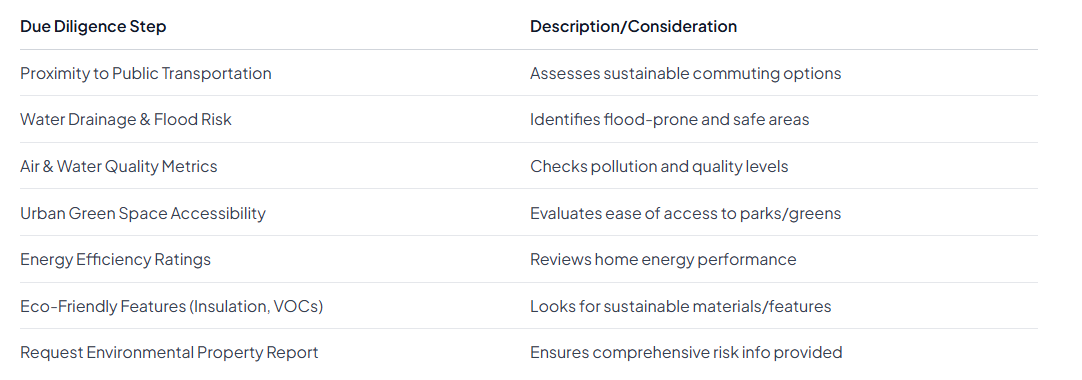
Environmental Factors Real Estate: Key Insights for Toronto & Durham Region 2025
Toronto and Durham Region’s real estate market is changing fast as buyers care more about the environment than ever before. You might think that price and location top the list, but 75 percent of homebuyers now say that environmental factors directly guide their home-buying decisions. That flips the script on what drives property value and why every investor and homeowner needs to look beyond the basics.
Why Environmental Factors Matter in Real Estate
Climate Change and Property Resilience
For instance, properties in low-lying areas or those susceptible to extreme weather events may face significant challenges. Natural Resources Canada indicates that climate-related risks can reduce property values by up to 15-20% in high-risk zones. This underscores the importance of comprehensive environmental assessments when purchasing real estate.
Sustainable Development and Property Value
Properties featuring solar panels, advanced insulation, rainwater harvesting systems, and native landscaping are attracting premium prices. These environmental considerations represent more than aesthetic choices; they are strategic investments in long-term property resilience and value preservation. Buyers in Ajax, Whitby, and Pickering are demonstrating a growing preference for homes that align with sustainable living principles.
The environmental factors influencing real estate extend beyond individual property characteristics. Proximity to green spaces, public transit infrastructure, and urban ecological corridors significantly impacts property desirability. Neighbourhoods that demonstrate environmental stewardship and forward-thinking urban planning are witnessing sustained property value appreciation.
“Real estate should never feel overwhelming. With the right agent, it won’t.” Fanis Makrigiannis, Real Estate Agent RE/MAX Rouge River Realty Ltd.
Investors and homeowners must adopt a holistic perspective when evaluating real estate opportunities. Environmental factors are no longer peripheral considerations but central determinants of property value, livability, and long-term investment potential. By understanding these complex interactions, stakeholders can make informed decisions that balance financial objectives with environmental sustainability.
Navigating this evolving landscape requires expertise, strategic insight, and a nuanced understanding of regional environmental dynamics. Whether you are a first-time homebuyer in Oshawa or an experienced investor in the Durham Region, recognizing the profound impact of environmental factors is crucial to successful real estate decision-making.
Evaluating Property Value: Local Environmental Concerns
Industrial and Ecological Impact Zones
Properties within 0.5 miles of industrial operations can see property values decline by 10-11%. National Center for Biotechnology Information studies demonstrate that toxic plant operations create measurable economic consequences for nearby residential properties. This phenomenon is particularly relevant in areas like Whitby, Oshawa and Pickering, where industrial and residential zones often intersect.
Below is a table summarizing the impact of industrial zones and green spaces on property values as described in this section:

Urban Green Space and Property Valuation

Contrary to industrial proximity challenges, urban green spaces represent a positive environmental factor in property valuation. University of Washington research indicates that properties near parks and with mature trees can experience value increases of 2-10%. In the Toronto and Durham Region, strategic proximity to green corridors, ravine systems, and well-maintained urban parks can significantly enhance property attractiveness.
Fanis Makrigiannis Realty recognizes that modern homebuyers prioritize properties offering ecological integration. Homes with native landscaping, mature trees, and proximity to conservation areas not only command premium prices but also demonstrate long-term environmental resilience.
Water and Air Quality Considerations
Homeowners and investors must conduct comprehensive environmental assessments that extend beyond traditional property inspections. This involves analyzing local ecological indicators, understanding watershed dynamics, evaluating air quality metrics, and assessing potential climate change vulnerabilities.
The evolving real estate landscape demands a holistic approach to property valuation. Environmental factors are no longer peripheral considerations but central determinants of economic value. Stakeholders who develop a nuanced understanding of local ecological dynamics will be best positioned to make informed investment decisions in the Toronto and Durham Region markets.
Tips for Homebuyers and Sellers in Toronto and Durham
Environmental Due Diligence for Buyers
For buyers in municipalities like Oshawa, Ajax, Whitby, and Pickering, this involves several key steps. Green City Times recommends investigating properties for eco-friendly features such as low-VOC materials, natural insulation, and water conservation systems. Potential homeowners should assess:
- Proximity to public transportation
- Water drainage and flood risk areas
- Local air and water quality metrics
- Urban green space accessibility
- Energy efficiency ratings
Fanis Makrigiannis Realty suggests that buyers should request comprehensive environmental property reports, which provide detailed insights into potential ecological risks and sustainability opportunities.
To help buyers organize their environmental due diligence process, here is a checklist of suggested steps and features to assess:

Strategic Selling in an Environmentally Conscious Market
To maximize property value, sellers should consider:
- Highlighting green infrastructure upgrades
- Documenting energy efficiency improvements
- Showcasing native landscaping
- Providing documentation of environmental certifications
- Demonstrating low-carbon footprint features
Modern buyers are increasingly sophisticated, seeking properties that offer both aesthetic appeal and environmental sustainability. A home that demonstrates ecological consciousness can command premium pricing in competitive markets like Toronto and Durham.
Collaborative Approach to Environmental Real Estate
Environmental considerations are no longer optional but essential. They represent a critical intersection of financial investment, personal lifestyle, and broader ecological responsibility. Homebuyers and sellers who approach real estate with this comprehensive perspective will be best positioned to make informed, future-proof decisions in the Toronto and Durham Region markets.
Ultimately, understanding environmental factors is about more than protecting investment; it is about contributing to sustainable urban development and personal well-being. By prioritizing ecological insights, stakeholders can create more resilient, valuable, and environmentally responsible real estate portfolios.
What Investors Should Know About Environmental Risk
Climate Change and Development Risks
Investors must consider multiple environmental risk factors, including:
- Flood zone vulnerability
- Urban heat island effects
- Potential infrastructure resilience
- Long-term climate change projections
- Ecological system stability
Fanis Makrigiannis Realty emphasizes that understanding these risks goes beyond traditional property assessment, requiring a forward-looking approach that anticipates potential environmental challenges.
Emerging Regulatory and Liability Landscapes
Key considerations for investors include:
- Comprehensive environmental site assessments
- Understanding emerging environmental regulations
- Evaluating potential contamination risks
- Assessing long-term environmental management costs
- Anticipating potential regulatory changes
Strategic Risk Mitigation for Real Estate Investors
Successful investors should implement a multi-faceted risk mitigation strategy:
- Conduct thorough environmental due diligence
- Develop comprehensive risk assessment protocols
- Diversify investment portfolios across different environmental risk profiles
- Invest in properties with robust environmental resilience
- Maintain flexibility in investment strategies
The future of real estate investment demands a holistic approach that integrates financial considerations with sophisticated environmental risk analysis. Investors who develop a nuanced understanding of ecological dynamics and regulatory landscapes will be best positioned to navigate the complex real estate markets of Toronto and Durham Region.
Ultimately, environmental risk is not just a challenge but an opportunity for forward-thinking investors. By embracing comprehensive environmental assessments and developing adaptive strategies, real estate investors can transform potential risks into competitive advantages in an increasingly complex market landscape.

Frequently Asked Questions
Environmental factors such as climate change risks, sustainable development practices, proximity to green spaces, and local water and air quality significantly influence property values and buyer preferences in these regions.
How does climate change affect property values in Toronto and Durham Region?
Properties located in areas susceptible to climate change risks, such as flood zones and urban heat islands, can experience decreased market values by 15-20%. Buyers are increasingly prioritizing properties with resilience to these changes.
What sustainable features should buyers look for in a home?
Buyers should prioritize homes that include energy-efficient systems, sustainable materials, solar panels, and water conservation systems. Properties with native landscaping and access to urban green spaces are also highly desirable.
How can environmental risks impact real estate investment decisions?
Investors must assess environmental risks such as flood vulnerabilities, regulatory changes, and potential contamination issues. Thorough environmental assessments and understanding of emerging regulations are crucial for making informed investment decisions.
Ready to Invest in Environmentally Smart Homes in Toronto & Durham Region?

Stop worrying about risky locations or missing out on sustainable features. Explore our featured listings and neighbourhood expertise or get personalized guidance for your next transaction. Connect today to discover how strategic choices can secure your future in Toronto and Durham Region’s most desirable, eco-forward communities. Book your consultation with Fanis Makrigiannis now and take control of your real estate journey before market trends move again.
Contact me personally to learn more.
About the author:
Fanis Makrigiannis is a trusted Realtor with RE/MAX Rouge River Realty Ltd., specializing in buying, selling, and leasing homes, condos, and investment properties. Known for his professionalism, market expertise, and personal approach, Fanis is committed to making every real estate journey seamless and rewarding.
He understands that each transaction represents a significant milestone and works tirelessly to deliver outstanding results.
With strong negotiation skills and a deep understanding of market trends, Fanis fosters lasting client relationships built on trust and satisfaction.
Proudly serving the City of Toronto • Ajax • Brock • Clarington • Oshawa • Pickering • Scugog • Uxbridge • Whitby • Prince Edward County • Hastings County • Northumberland County • Peterborough County • Kawartha Lakes
Fanis Makrigiannis
Real Estate Agent
RE/MAX Rouge River Realty LTD
(c): 905.449.4166
(e): info@fanis.ca
Recommended
Why Buy in Toronto: Real Estate Opportunities in 2025 - Fanis Makrigiannis Realtor®
Why Real Estate Investing Matters in Toronto & Durham 2025 - Fanis Makrigiannis Realtor®
Real Estate Market Predictions 2025 for Toronto & Durham - Fanis Makrigiannis Realtor®


